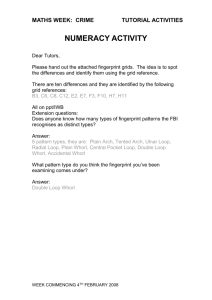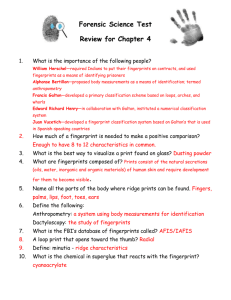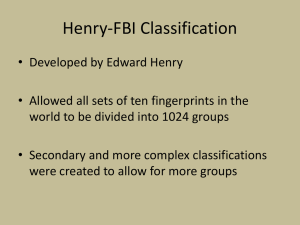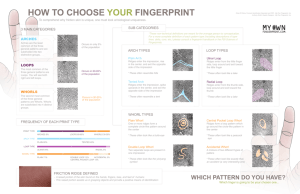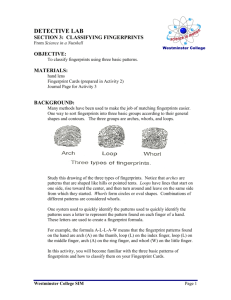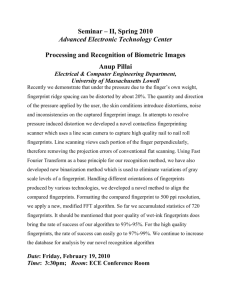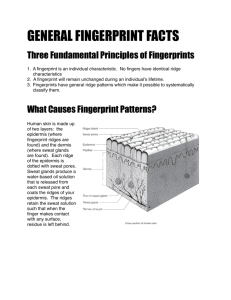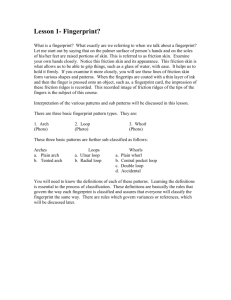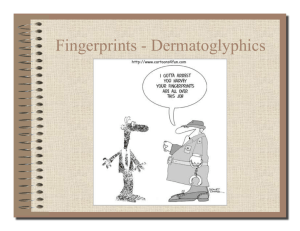Fingerprints
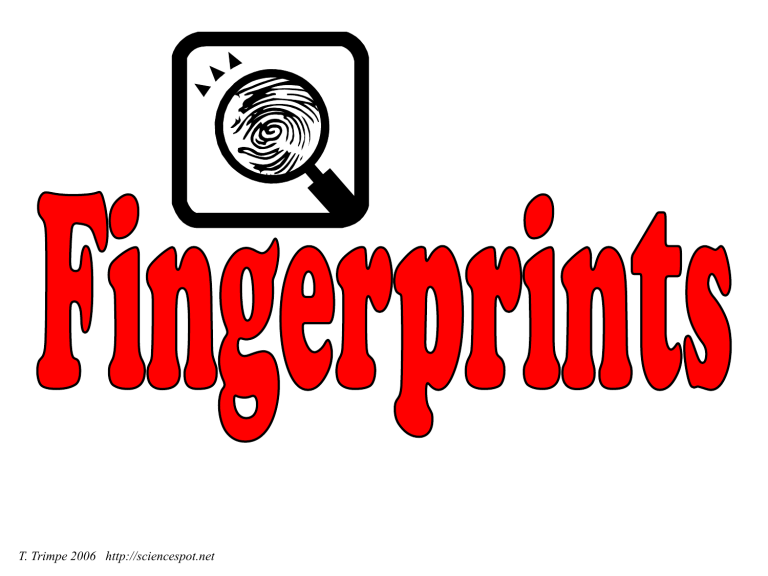
T. Trimpe 2006 http://sciencespot.net
Fingerprint Principles
According to criminal investigators, fingerprints follow
3 fundamental principles:
• A fingerprint is an individual characteristic; no two people have been found with the exact same fingerprint pattern.
• A fingerprint pattern will remain unchanged for the life of an individual; however, the print itself may change due to permanent scars and skin diseases.
• Fingerprints have general characteristic ridge patterns that allow them to be systematically identified .
Fingerprint Classes
There are 3 specific classes for all fingerprints based upon their visual pattern: arches, loops, and whorls.
Each group is divided into smaller groups as seen in the lists below.
Arch
Plain arch
Tented arch
Loop
Radial Loop
Ulnar loop
Whorl
Plain whorl
Central pocket whorl
Double loop whorl
Accidentical
Interesting Info
Fingerprint Factoid:
60% of people have loops, 35% have whorls, and 5% have arches
Did you know?
Dactyloscopy is the study of fingerprint identification.
Police investigators are experts in collecting
“dactylograms”, otherwise known as fingerprints.
Arches
Arches are the simplest type of fingerprints that are formed by ridges that enter on one side of the print and exit on the other. No deltas are present.
Spike or “tent”
Plain Arch
Ridges enter on one side and exit on the other side.
Tented Arches
Similar to the plain arch, but has a spike in the center.
Loops
Loops must have one delta and one or more ridges that enter and leave on the same side.
These patterns are named for their positions related to the radius and ulna bones, i.e. the bone the loop opening is facing towards.
Left
Hand
Ulna
Radius
Delta
L – Radial Loop
R - Ulnar Loop
L – Ulnar Loop
R - Radial Loop
X-Ray Imagine: http://www.tooloop.com/wp-content/uploads/2013/12/Radius-Ulna-X-Ray.jpg
Whorls
Whorls have at least one ridge that makes (or tends to make) a complete circuit. They also have at least two deltas. If a print has more than two deltas, it is most likely an accidental.
Plain
Whorl
Central
Whorl
Draw a line between the two deltas in the plain and central pocket whorls. If some of the curved ridges touch the line, it is a plain whorl. If none of the center core touches the line, it is a central pocket whorl.
Whorls – Part 2
Double Loop Whorl Accidental Whorl
Delta
Delta
Double loop whorls are made up of any two loops combined into one print.
Accidental whorls contain two or more patterns (not including the plain arch), or does not clearly fall under any of the other categories.
Identify each fingerprint pattern.
Left Hand
Right Hand
Right Hand
Right Hand
Left Hand
Lab Write Up
• Title: Fingerprint Lab
• Problem: Which is the most common type of fingerprint in our class?
3 Types of Fingerprints
Loops
60-65% of people
Whorls
30-35 % of people
Arches
5 % of people
`
Hypothesis
Hypothesis: If… then…because…
If each person finds their fingerprint type, then the _________ (loop whorl, arch) fingerprint will be the most common b ecause __________
Variables
Independent Variable (the one thing you change) – the type of fingerprint
Dependent Variable (the one thing you measure) – the number of fingerprints/percentage of fingerprints
Materials
• 1 piece of scratch paper
• 1 pencil
• 1 magnifying glass
• 1 roll of clear tape
Procedure
1. Rub the pencil on the scratch paper until there is a smudge of graphite the size of your fingertip.
2. Select which hand you will take fingerprints from.
3. Beginning with your thumb. Rub it on the smudge until your thumb is covered in graphite.
4. Place a small piece of tape over your thumbprint and press down gently.
5. Carefully remove the tape and stick it in the appropriate square on your data table.
6. Repeat the process for the other 4 fingers of your hand.
7. Look at your fingerprints and identify which type of fingerprint you have.
8. Record the group tallies for each type of fingerprint and then find the total and percentage of each.
Loop
TABLE DATA
Data
Identify your type of fingerprint
`
Loop
Graph
• Create a Bar Graph of your group data in
Google Spreadsheet . (You will copy this graph into your Lab Doc)
• Title the Graph: Fingerprints
• Title the X- Axis: Types of Fingerprints
• Title the Y-Axis: Percentage of Students
• Remember Percentage is the Number of the Type divided by the Total Number of
Fingerprints. Ex: 4 Loops from the group/10
Total Fingerprints from the Group = .4
• Then multiply .4 x 100= 40%
After you complete your graph and lab report…
• Reflect on the answer to your bellwork question. Add to or revise your answer based on what we learned in this lab.
• Then answer the following question:
How will practicing classification help you understand human body systems?
• SHARE your Fingerprint Lab document with me.
